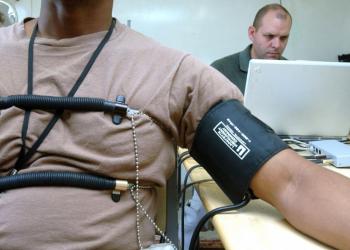
Questioning criminal suspects who are not in custody does not require a Miranda advisal or waiver.
A Beheler admonishment, telling a suspect that he is not under arrest and is free to go, at least under the right circumstances, avoids the need to Mirandize a criminal suspect before questioning him.
Defendant Robert William Potter had been sexually molested by an uncle when he was 12 or 13 years old. He also engaged in “inappropriate sexual contact” with his brother and sister when he was still a child, and then again with his sister when he was a little older. None of this, apparently, was ever revealed. Defendant eventually married and had several children, including a daughter referred to here simply as “H.” Over the first five years of H.’s life, defendant and his wife separated several times. Once, in 2015 when H. was three years old, she’d told her mother that defendant had put his penis in her mouth (calling it the “popsicle game.”). But H. refused to talk about it when interviewed by counselors at the “special assault forensic evaluation” (SAFE) center, and defendant denied the accusation. So defendant’s wife let him back into their lives, although not for long. In March, 2017, when H. was five years old, she again complained about being sexually abused by defendant. This time, she was able to talk about it with a police officer and then again to counselors at the SAFE center. So defendant’s wife took the children (H. and the other sibling, K.), and left him. Following up on this complaint, Detective Jenny Wirtz called defendant via telephone on December 5, 2017, and asked him if he would agree to come down to the police station for an interview. Defendant said that he would. But before this conversation was over, Detective Wirtz asked defendant if he’d ever been sexually assaulted in his past. Defendant said that he had, telling Detective Wirtz about the incidents with his uncle and siblings. Told that “(t)here's been some allegations,” defendant responded that he had not spoken to H.’s mother since she “took ’em away,” adding: “So I—I have no information on anything.” Talking briefly about the allegations H. had made against him, defendant denied any wrongdoing. While continuing to deny that he’d molested his daughter, defendant eventually agreed to come to the station to undergo a polygraph examination. He finally came to the station two weeks later—December 19th—and was placed in an interview room. He was contacted by Detective Konrad VonSchoech who was to conduct the pre-polygraph interview. Detective VonSchoech immediately told defendant that the interview was completely voluntary, adding “you don’t have to talk to me if you don’t want.” Defendant responded: “I got you.” But to be sure defendant understood, Detective VonSchoech further told defendant: “You can stop this anytime you want and walk out, there's the door.” Acknowledging that the door was closed, Detective VonSchoech explained that it was closed “for privacy, but it’s unlocked.” Defendant stated: “Right I know what you mean.” The detective continued: “You can walk out anytime you want, right?” From this point on, in a 30-minute interview, the Detective VonSchoech discussed with defendant H.’s allegations in a manner that apparently made defendant feel like the detective was on his side, and that the molest was not all defendant’s fault, given his prior history of being abused himself. The questioning centered on the fact that defendant had never been given the opportunity to receive treatment for the problems his abuse had caused him, and that they only way his daughter (who he continually claimed to love very much) could recover from her having been abused by defendant would be for defendant to acknowledge what he had done. Defendant eventually admitted to molesting H. He was then moved to a second interview room where Detective Wirtz spoke with him for about an hour and a half in two separate interviews. At the initiation of the first interview, Detective Wirtz advised defendant that that the door to the room was unlocked and that he was free to leave. Defendant repeated his admission to having committed at least one incident of oral copulation with H., and then adding to his confession an admission to five other similar incidents. At Detective Wirtz’s suggestion, defendant also wrote an apology to H. for having molested her. Although intending for this interview to be recorded, it was soon discovered that the recorder wasn’t working. So defendant submitted to a third, recorded, interview. At the beginning of this third interview, Detective Wirtz told defendant: “Um, so again thank you for coming in voluntarily. You're not under arrest. The door’s unlocked. You[’re] free to go, um, at any time.” Defendant thereafter repeated his confession to the six separate incidents where he’d orally copulated H. After having been questioned for a total of under two hours in the three interviews described above, defendant was released to return home. He was physically arrested three days later. Charged in state court, defendant challenged the admission into evidence of his three confessions, arguing that his Fifth Amendment self-incrimination rights had been violated because he had not been advised of his Miranda rights. The trial court denied his motion, admitting into evidence his confessions. Convicted of one count of oral copulation with a child 10 years of age or younger, defendant was sentenced to serve an indeterminate term of 15 years to life in state prison. He appealed.






